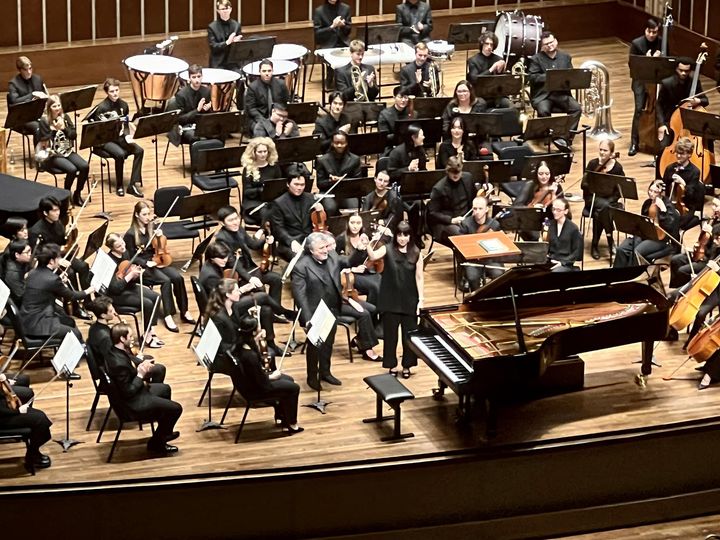Does Pittsburgh attack make Rufus Wainwright’s opera antisemitic?
mainThe Montreal composer Joseph Glaser thinks it might:
To the COC artistic direction and the artistic team behind Hadrian,
Yesterday afternoon, like so many around the world, I read in horror of the 11 Jews killed by gun violence in a synagogue in Pittsburgh. The gunman had shouted, “all Jews must die” before opening fire on the congregation. As each detail came out I have been more and more disturbed by this attack on my people.
But it occurred to me that I had heard these words before. I had heard them sung two days before by professional artists with the support of an orchestra of 75 players and millions of dollars of funding. Before it played out, in reality, I had seen this scenario played out in your production….
Read on here.







I would never attend anything by or with Rufus Wainright as a matter of course. But this important essay on what was airbrushed away by him and his librettist (to make room for more a more convenient slant) seals the fate.
Hadrian has an exceptionally bad place in Jewish history, one of the worst before the Holocaust, as afantical persecutor of Jews.His story does have interesting connotations in theology, Antinous being the young man sacrificed as in the much better known event a century earlier. It is strange to come across Jews called Adrian, or for that matter Isabella.
From the ‘open letter’:
“For context, the Hadrianic persecutions of the Jewish people in response to the Bar Kokhba rebellions are some of the defining moments in our history. Jewish culture was profoundly changed because of the systematic destruction of Jewish villages and places of worship, including the torture and execution of the leading rabbis and the desecration of the temple mount. One million people died in the combined casualties of the rebellion, persecutions, and famine resulting from Roman policy in the area. Historians have pointed to this moment as the one where the Jewish people lost its homeland and became a primarily diasporic population.”
This is a very one-sided interpretation of historic evidence. The Jewish rebellion was a more complex phenomenon:
https://www.britannica.com/event/Second-Jewish-Revolt
Everywhere, where Rome conquered lands, and after the first cruelties had subsided, they included the new areas into the commonwealth of their multicultural empire, worked together with local ruling elites, and made sure that the inhabitants enjoyed the many advantages of the new international context, in which their own culture was left intact and only an ‘extra layer’ of modern civilization was added to existing life, in terms of economic increase, practical progress (roads, postal service, banking system etc.) and a more developed justice system, plus the accessibility of international products including cultural products. Every conquered people accepted, after a while, Rome’s hegemony as long as they could have the advantages (this changed, of course, over time). The only conquered people who resisted the inclusion within a wider international world, were the Jews, who differed strongly in their culture and religion from the surrounding peoples which they looked down upon. Their old religious and entirely crazy mutilation ritual of circumcision, however understandable from a people living in the desert, was seen as barbarous by the romans and especially by Hadrian. His attempts to add a Roman layer over an existing culture was then thwarted.
That this sort of religious mutilation still exists, demonstrates the irrational and barbaric components of so many religions.
“Rabbinical literature alludes to a Hadrianic persecution that caused fear and apostasy. The probable explanation of this kind of reference is a universal ban on circumcision that Hadrian issued in, it seems, the early 130s. The emperor had an abhorrence of physical mutilation and even went so far as to declare that castration was no less a crime than murder. In the same spirit he denounced and forbade circumcision, which he viewed as mutilation. There is no reason to imagine that Hadrian intended by his measure to punish or provoke the Jews. The uprising came swiftly and understandably.”
The personal involvement of Hadrian is, to say the least, questionable:
“Hadrian’s visit to Athens in 131–132 and his residence at Rome until the summer of 134 suggest a reluctance to deal personally with the disturbance in Judaea. He first placed an able general, Sextus Julius Severus, in charge of the problem. In the year after Hadrian’s arrival in the Near East, the revolt was over. Recent discoveries have shown that several measures connected with the close of the revolt and often cited as indications of imperial severity have to be dated at least six years earlier and, very probably, well before that. Hadrian meted out no savage punishments in 135.”
https://www.britannica.com/biography/Hadrian
“Yes, but what have the Romans ever done for us? Apart from better sanitation and medicine and education and irrigation and public health and roads and a freshwater system and baths and public order…”
Indeed…. But the tragedy was, I think, the complete incomprehension of the Romans of a small country where the inhabitants set more value on immaterial things than in the obvious progress they could bring. What was the point of public baths if your soul was suffering? For a Roman, you could have both without problem, as you could have a temple for Jehova next to one for Jupiter. But that was a bridge too far. And so, the tragedy of the Jewish people began, the echos of which we see in the ‘open letter’ concerning a silly opera.
Putting aside whatever merits or demerits Wainwright’s opera itself has (I haven’t seen it), the problem of leaving out history in favor of a particular story isn’t new. After all, Mozart’s La Clemenza di Tito leaves out Titus’ destruction of Jerusalem and the Second Temple and Bach’s setting of the blatantly anti-Semitic Gospel According to St. John doesn’t flinch one bit. And, these are hardly the only works. On a different end of the scale there is Un Ballo in Maschera, the heterosexual whitewashing of the homosexual life of Gustav III. Granted these are all different things, but what do we do with these works? I would think that the story and libretto of Wainwright’s opera could easily be altered as was done repeatedly to Verdi’s Ballo. Is this a real answer? Do we bury the work? Then what do we do with Bach and Mozart? Do we have to forbid telling one story because it omits telling another one, no matter how ominous? I don’t know, but I don’t think the answer is an easy one.
Bach does flinch, very much. For a convincing analysis of how Bach avoids ant-semitism in the St. John Passion see Michael Marissen’s “Bach’s St. John Passion and “the Jews”” in his Bach & God (OUP 2016).
I wouldn’t describe what Bach did in that regard to be “flinching.”
There’s is no indication that Bach, an orthodox Lutheran, was any more or less anti-Semitic than the rest of society in his time and place, and there’s still less indication that he had any objection to or discomfort with the Gospel text (which was to him, after all, Holy Writ).
I’ve always understood Marissen’s point to be that the fact that John’s account seems to hold the Jews in particular responsible for Christ’s crucifixion was, for Bach, not particularly relevant: Christ willingly underwent suffering and death (which, being God and all, he could have avoided) in order to redeem each and every individual sinner, and the point of worship on Good Friday was for each individual sinner to contemplate his or her relationship to Jesus and his suffering.
St John’s account held those particular Jews at that time and place, who had gathered on that particular square, responsible, not the entire race in all eternity. And Bach simply received that text to set to music so why would he complain? He was in the service of the church.
Just because many people have used John’s gospel to motivate hostility to Jews does not, in itself, make the gospel “blatantly anti-Semitic.” John was, after all, himself Jewish (and understood himself to be Jewish). If anything, he hoped that the other Jews would come to recognize Jesus as the messiah, as he did.
While it is true that Tito commanded a Roman army in Judea, putting down a Jewish revolt. Judea was a rather small province of minor importance. And the revolt was barely noticed in Rome.
Interesting review. Sad, as well, for I’d be shocked if the author and composer meant what you describe … Everybody loses …